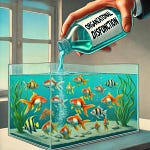My very first Serious Thought about COVID-19 was that it caused brain damage in light of the “loss of smell and taste” symptom that emerged very early in The Discourse (I wrote a bit about that here).
The evidence continues to stack up as we witness the multi-system attacks from COVID-19 (that’s a statement, eh? “Multi-system” as in both biological and social, but I’m talking about the human body at this moment).
And I’m here to help you and your org prepare for the changed landscape. So is the MIT Sloan Management Review, apparently, as this quarter’s issue includes a great piece by Dr. Maureen Dunne, who advances an argument that hiring neurodiverse talent specifically from community colleges will help mitigate the labor challenges across industries and increase the employment among people who are neurodivegent1.
But here’s what I know like I know my own name: Orgs aren’t ready. Want proof? Let’s conduct a thought experiment.
One thing I’ve advocated for in organizations is an interview process that allows candidates to play to their strengths because — as it currently stands — many interview processes inherently, unconsciously, and uncritically prioritize certain ways of being in the world.
For example, the standard interview process of unanticipated questions and required answers will favor candidates like me (and maybe you have lots of people like this in your org):
People who are good storytellers, who use linear (Western) story techniques, whose cognitive processes are not impeded by the static of anxiety, who have strong recall, who are verbal processors, and who embody extraversion in their delivery: Smiles, strong eye contact, an overall commanding presence.
Are those the things required for the job, I often ask?
And the respondent will state, YES. Of course they are. But are they really? You need someone who can immediately pull a story from their past experiences to demonstrate how they would deal with a problematic customer?
Or do they need the skills for dealing with problematic customers? These are two different things. Your interview process probably isn’t measuring what you think it is.
Some of my considerations about how to change orgs come out of watching neurodivergent people close to me attempt to navigate orgs that like to call themselves inclusive but are anything but, and often the evidence emerges immediately…like during the interview process.
I make the suggestion, then, that candidates should be provided with a written list of interview questions in advance.
CUE THE FIGHTING, y’all, because people will defend their current practices to the death. I’ve heard people argue against this idea because it’s “unfair” or “illegal” (what?) or because “I need someone who can think on their feet.”
For example, someone vehemently argued with me about this point in faculty searches. They said, “We need people who can think on their feet because the classroom is unpredictable.”
Are you suggesting, I gently replied (ha), that this here artificial set of circumstances (the interview process with strangers) where our candidate has the least power and control somehow replicates the dynamics of a classroom where a faculty member arguably has the most control over the proceedings as well as established relationships? You’re suggesting that the dynamics of these situations are the same?
They’re not. They’re not even close.
Here’s my advice, then. First, if you want to take Dr. Dunne’s argument here and operationalize it with a focus on how we can adapt our environments for neurodiversity because you’re compelled by the metrics around a labor shortage and the number of neurodivergent people in need of employment, great. Do that. Remember, though, that our environments need critical evaluation, which she notes:
On a practical level, this might entail mentoring neurodivergent personnel during onboarding - providing clear success metrics, avoiding ambiguity, and allowing universal access to noise-canceling headphones and other accommodative tools and practices. In addition, some neurodivergent people are much more productive in familiar environments, so demonstrating an openness to hybrid or remote workplace protocols could signal a more receptive attitude toward their needs.
But these steps have little impact when an organizational culture fails to embrace psychological safety, trust, anti-bullying policies, and clear communication standards. In other words, no matter how much sunlight and water you make available, a garden won't grow in toxic soil. The stakes are high, and the payoff is potentially huge for forward-looking organizations willing to embrace authentic neurodiversity inclusion and belonging. But a cosmetic effort will have little impact.
(Ah, note the appearance of my favorite favorites, psychological safety and trust.)
But if you’re not compelled by those ideas — if the labor shortage isn’t affecting your org or you don’t care about the plight of neurodivergent humans — consider how you’ll need to adapt your hiring practices and organizational environments for the masses as the effects of COVID-19 continue to show themselves across wide swaths of people in what has been a mass debilitating event.
(And will continue to be, btw. COVID numbers are up, up, up as of the date of this publication [Sidenote: I am in love with the wastewater dashboard].)
Even the people who could once engage in easy recall or who didn’t find themselves facing cognitive processing challenges may find themselves struggling. Does that mean they can’t be effective in the job for which you’re hiring, or does it mean that you’re evaluating something in the interview process that’s actually immaterial in the reality of the job itself?
These are good questions for organizations to ask themselves as we chart a future that meets the demands of our actual reality.








Share this post